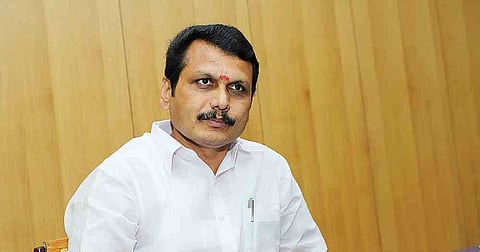

THE SUPREME COURT TODAY issued notice to the Enforcement Directorate (‘ED’) on a petition by former Tamil Nadu minister V. Senthil Balaji, who has sought a relaxation of the bail conditions imposed on him in the money laundering case connected to the cash-for-jobs scandal.
A Bench of Chief Justice-designate Justice Surya Kant and Justice Joymalya Bagchi asked the ED to clarify whether Balaji’s continued appearance before the agency still required in pursuance of the conditions laid down while granting him bail on September 26, 2024, by the top Court.
During the proceedings, the ED opposed any dilution of the bail conditions. The agency submitted that the earlier Bench was fully aware of the strict conditions it was prescribing, and that those very conditions had facilitated an uninterrupted and smooth trial.
Senior Advocate Kapil Sibal, appearing for Balaji, countered that the investigation is complete and a complaint has already been filed, making the ED’s opposition “purely adversarial.” He stressed that Balaji has cooperated fully, pointing out that he has appeared before the agency 116 times and has never attempted to evade the process of law.
The Supreme Court had granted Balaji bail on September 26, 2024.
Senthil Balaji seeking modification of two key conditions
In the present application, Balaji seeks modification of two key conditions. The first requires him to mark his attendance every Monday and Friday between 11 a.m. and 12 noon at the office of the Deputy Director, ED, Chennai, in addition to appearing before investigating officers on the first Saturday of every month in relation to the three scheduled offences.
The second condition mandates his regular and punctual presence before all courts dealing with the scheduled offences as well as the special PMLA court, and requires full cooperation to ensure early disposal of the cases.
Balaji was arrested on June 14, 2023, in a money laundering probe linked to the alleged cash-for-jobs racket during his tenure as Transport Minister in the previous AIADMK government. The ED arrested him based on an Enforcement Case Information Report (‘ECIR’) registered in 2021, which stemmed from three FIRs filed in 2018 over allegations that he accepted money in exchange for state transport jobs during the 2011–2015 period when he served under late Chief Minister J. Jayalalithaa.
Balaji joined the DMK in December 2018 and was appointed Electricity Minister after the party returned to power in May 2021.
Supreme Court’s September 26, 2024 order
The Supreme Court by its September 26, 2024, order granted bail to Senthil Balaji noting that with over 2,000 accused and more than 600 prosecution witnesses, the trial was unlikely to conclude in the next three to four years—and could take even longer. The Court observed that keeping the accused incarcerated for such an unreasonable duration would violate his fundamental right to a speedy trial under Article 21 of the Constitution.
While allowing Balaji’s bail plea, a Bench of Justices Abhay S. Oka (since retired) and Augustine George Masih recorded that he had already spent 15 months in custody. The Court also noted that under Section 4 of the Prevention of Money Laundering Act, 2002 — under which he was charged—the minimum sentence was three years, while the maximum was seven years.
Ordering that Balaji be enlarged on bail, Justice Oka, speaking for the Bench, said, “...the appellant (Senthil Balaji) has been incarcerated for 15 months or more for the offences punishable under the PMLA. In the facts of the case, the trial of the scheduled offences, and consequently the PMLA offences, was not likely to be completed in three to four years or even more. If the appellant’s detention was continued, it would amount to an infringement of his fundamental right under Article 21 of the Constitution of India to a speedy trial.”
The Court directed that Balaji furnish a bail bond of ₹25,00,000 with two sureties of the same amount. It also required him not to contact or communicate—directly or indirectly—with prosecution witnesses or victims, to mark his attendance at the office of the Deputy Director, ED, Chennai, every Monday and Friday between 11 a.m. and 12 noon, to appear before the investigating officer on the first Saturday of every month, to surrender his passport before the special PMLA court, and to remain regular and punctual in his appearance before the courts handling the scheduled offences and PMLA proceedings, cooperating fully in the early conclusion of the trial.
The Court further held that if Balaji sought adjournments on “non-existing or frivolous grounds” or created hurdles in the expeditious disposal of the cases, the bail granted to him would be liable to cancellation.